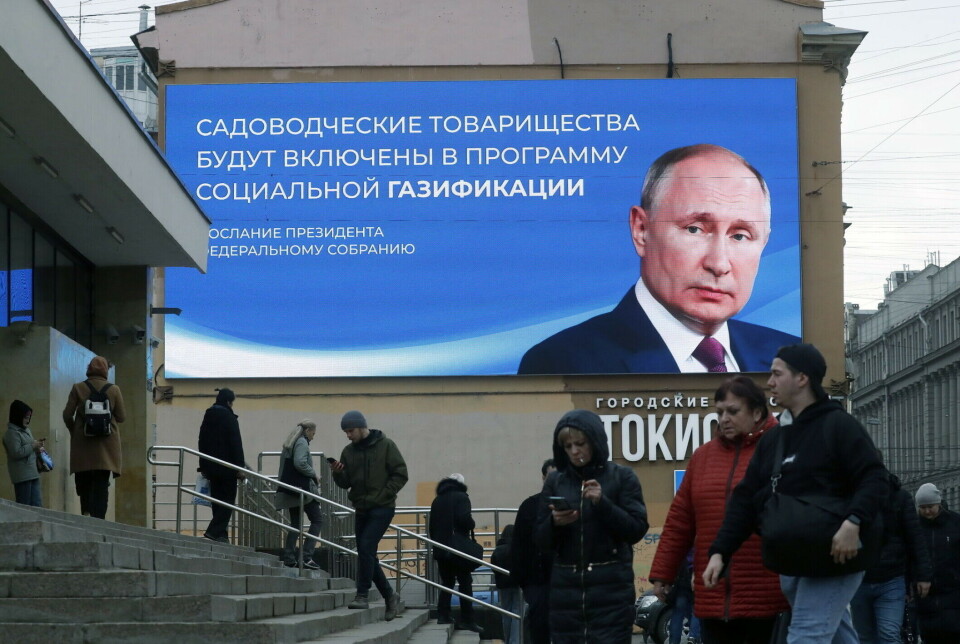
Researchers: There are signs that the war is beginning to strain Russia's economy
The Russian population has seen significant economic improvements after the invasion of Ukraine. However, in Russia's 2025 state budget, researchers note signs that the war is beginning to take a toll on the economy.
Cecilie Sendstad and Julie Helseth Udal have been researching the Russian economy since long before Russia's full-scale invasion of Ukraine in 2022.
They believe it is important to follow the economic development in Russia – both to gauge how long Russia can afford to continue waging war at its current pace, but also how it affects the average Russian.

"This could also indicate people's willingness to support the Putin regime,” says Udal.
Higher wages and lower unemployment
Many believed that when economic sanctions, such as the ban on importing Russian oil and gas, were introduced, the Russian economy was on the verge of collapse.
This did not happen. The Russian economy has offered many surprises, the researchers say.
Social economist Sendstad has calculated that the war in Ukraine costs Russians roughly 180 million USD daily. Nevertheless, the Russian population has experienced significant economic improvement.
According to Russia's official statistics agency, Rosstat, real wages in Russia increased by almost 8 per cent in 2023. Growth has continued throughout 2024.
Unemployment is the lowest it has been since the fall of the Soviet Union.
The financial situation of people outside the workforce has also improved. Pensions increased by 3.3 per cent in 2023.
Reduction in social spending
The researchers report that none of the Russian state budgets for 2022, 2023, and 2024 were downgraded.
In the 2025 state budget, researchers note for the first time since 2022 that some areas are deprioritised. It outlines an actual reduction in social spending of around 20 per cent.
“This may indicate that Russia has reached a point where they must cut certain expenses to finance the war,” says Udal.
Such cuts could affect welfare schemes and have long-term consequences for the Russian population, the researchers believe.
Is this just propaganda?
The researchers constantly question whether it can really be true that the Russian economy has only improved since going to war or whether this is propaganda to make it appear that things are going well in Russia despite the sanctions.
Finding reliable answers requires pulling data from many different sources.
“For example, we use information from supposedly independent opinion polls on how people feel about their situation. In today's Russia, this is information we need to critically assess,” says Udal.
When they study statistics and opinion polls among private business owners, they see that they are struggling to find employees.

“This gives us more confidence in the official employment statistics, although we still have to take precautions,” she says.
The working class benefits most from the war
Researchers from the Finnish research institute BOFIT conducted a study earlier this year on changes in bank deposits in various Russian regions.
They found unusually high growth in several low-income regions, indicating where soldiers recruited for the war might come from.
When the researchers break down the official Russian figures for wage growth across various regions, they observe similar patterns.
Wage growth varies between different regions. In 2023, it was particularly strong in several low-income areas.
“This may be due in part to increased wages in the defence industry and that a large number of people from these areas have been recruited for the war in Ukraine. The middle class in the larger cities has seen lower wage growth,” says Udal.
It thus appears as if the Russian working class has benefited the most from the war. Those who run private businesses in Russia have not had it easy. They face higher costs, and tax levels will also increase in 2025, according to Sendstad.
A signal to the West?
In the 2025 state budget, Russia signals another substantial increase in defence spending. Nearly a third of the state budget next year will go to the armed forces.
Until now, Russia has only budgeted for an increased defence budget for one year, with subsequent years showing a return to normal levels. An important change in this year's budget is the inclusion of very high defence expenditures for the entire three-year planning period.
“This could be a signal to the West that they have no intention of giving up anytime soon,” says Sendstad.
Where is the money coming from?
Since Russia invaded Ukraine in 2022, Russian authorities have spent more state funds across various sectors, not just defence.
The researchers believe that the Russian state budget is in a significant deficit. This deficit is financed by increasing national debt, raising taxes, and drawing funds from the country's ‘oil fund,’ called the Russian National Wealth Fund.
This fund includes money earmarked for future pensions.
Central Bank is concerned
The governor of the Central Bank of Russia, Elvira Nabiullina, has expressed concern over the country’s economic developments.
The Central Bank has increased the key interest rate to 19 per cent, and inflation is now at 9 per cent. Fiscal policy must be tightened even more to curb inflation and price increases, she believes.
However, the national debt is not due until the late 2030s. Therefore, the Russian authorities can continue this spending for years to come and delay the problems, according to researchers at the Norwegian Defence Research Establishment (FFI).
The less Russians feel the war's impact on their wallets, the less reason they have to oppose the war. Low unemployment and rising wages and pensions contribute to domestic stability, the researchers wrote in an op.ed earlier this year (link in Norwegian).
Have evaded sanctions
Russian economists have been good at circumventing sanctions, says Sendstad.
“They’ve used every tool in their toolkit to restructure the economy. The most surprising is how they’ve managed to secure vessels and boost petroleum exports, allowing them to sell oil and gas in similar quantities as before," she says.
India has become an important importer of petroleum.
China also now purchases significantly more oil and gas from Russia, and Russia imports more from China.
Trade data shows that China is filling the void left by the West.
Technology previously supplied by the West now comes from China.
“Business owners report in surveys from the Central Bank of Russia that the quality is worse and the goods more expensive. This applies to machinery tools, which are essential in the defence industry. These tools are essential for mass production,” says Udal.
Much more is classified
Despite successfully redirecting import and export flows to other trade partners, sanctions have had a considerable impact, says Sendstad.
“Like Norway, Russia has seen massive income increases from oil and gas in recent years. Without sanctions, the Russian economy would likely be doing significantly better,” she says.
The two researchers will continue to monitor developments in the Russian economy but admit that it may become more challenging.
In the latest state budget, the authorities have classified far more information than in previous years. Moreover, the unclassified sections contain less relevant information than before, according to Udal.
Since the full-scale invasion in 2022, Russian authorities have withheld various other types of economic statistics.
“Increased classification and secrecy make our work more difficult, and we now have to use more sources than before,” she says.
Reference:
Makroøkonomisk utsyn i Russland – våren 2024 (Macroeconomic outlook in Russia – spring 2024), Norwegian Defence Research Establishment (FFI) memo, 2024.
———
Translated by Ingrid P. Nuse
Read the Norwegian version of this article on forskning.no
Related content:
Most viewed

Subscribe to our newsletter
The latest news from Science Norway, sent twice a week and completely free.






































